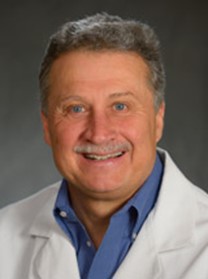
|
Experts in the Hot Seat: Precision Therapy with Emerging Cytokine Inhibitors in Asthma
Allergy/ Immunology
Curriculum:
The Future of Asthma Management: Precision Therapy with Emerging Cytokine Inhibitors
The Future of Asthma Management: Precision Therapy with Emerging Cytokine Inhibitors
Credits:
1 AMA PRA Category 1 Credit(s) ™
1 AMA PRA Category 1 Credit(s) ™
Launch Date:
March 14, 2017
March 14, 2017
Expiration Date:
The accreditation for this activity has expired.
The accreditation for this activity has expired.
Primary Audience:
Physicians, nurse practitioners, and physician assistants who specialize in allergy/immunology and pulmonology
Relevant Terms:
Asthma
Bradley E. Chipps, MD
Bradley E. Chipps, MD
Medical Director, Respiratory Therapy and the Cystic Fibrosis Center
Sutter Medical Center
Associate Medical Director
Sutter Community Hospitals Sleep Laboratory
Sacramento, California
Bio

Bradley E. Chipps, MD, received his medical degree from the University of Texas Medical Branch in Galveston, Texas. He was a pediatric resident for two years before serving in the Air Force at Ellsworth Air Force Base in South Dakota for two years as a General Pediatrician. He then completed a combined Allergy and Pulmonary Fellowship at Johns Hopkins and spent one year on the faculty in the Pediatric Respiratory Sciences Division.
Dr Chipps has been in private practice in Sacramento for 37 years and is Medical Director of Respiratory Therapy and the Cystic Fibrosis Center at Sutter Medical Center in Sacramento, California. He established and is also Associate Medical Director of the Sutter Community Hospitals Sleep Laboratory. Dr Chipps is the Vice President of the American College of Allergy, Asthma & Immunology. He is Board Certified in Pediatric Pulmonology and Allergy and Clinical Immunology.
David M. Lang, MD
David M. Lang, MD
Professor of Medicine
Chair, Department of Allergy and Clinical Immunology
Co-Director, Asthma Center
Director, Allergy/Immunology Fellowship
Respiratory Institute
Cleveland Clinic
Cleveland, Ohio
Bio

David M. Lang, MD, serves as Chairman of the Department of Allergy and Clinical Immunology, Co-Director of the Asthma Center, and Director of the Allergy/Immunology Fellowship Training Program in the Respiratory Institute at the Cleveland Clinic. Dr. Lang also teaches Evidence Based Medicine at the Cleveland Clinic Lerner College of Medicine.
Dr. Lang received his medical degree from the University of Michigan in Ann Arbor and completed residency training in Internal Medicine at Henry Ford Hospital in Detroit. Dr. Lang also served an additional year as chief medical resident, prior to pursuing subspecialty training in Allergy and Clinical Immunology at Scripps Clinic and Research Foundation in La Jolla, California.
Dr. Lang has carried out a number of research projects, including studies of the epidemiology of urban asthma, drug allergy, anaphylaxis, and chronic urticaria. He has been active in national and regional medical organizations, and has published more than 100 articles in the medical literature. Dr. Lang has been a member of the Joint Practice Parameters Task Force for the specialty of Allergy and Immunology since 2001, and currently serves as Co-Chair of this Task Force. He recently completed a 4-year term on the Board of Directors of the American Academy of Allergy, Asthma and Immunology. He currently serves as Chair of the National Quality Forum Pulmonary and Critical Care Standing Committee and is a member of the National Quality Partners Antibiotic Stewardship Action Team.
Dr. Lang has been selected annually as a "Top Doc" in Allergy/Immunology by Cleveland Magazine and as one of the Best Doctors in America for more than a decade. He currently serves as Deputy Editor for the Journal of Asthma, and is on the Editorial Board of Allergy and Asthma Proceedings; he previously served as Associate Editor and Section Editor of the Annals of Allergy, Asthma, and Immunology. Dr. Lang received the Hahnemann University Hospital Leadership Award and was the recipient of the Pharmacia Allergy Research Foundation Award at the International College of Allergology and Clinical Immunology meeting in Stockholm.
Dr. Lang has carried out a number of research projects, including studies of the epidemiology of urban asthma, drug allergy, anaphylaxis, and chronic urticaria. He has been active in national and regional medical organizations, and has published more than 100 articles in the medical literature. Dr. Lang has been a member of the Joint Practice Parameters Task Force for the specialty of Allergy and Immunology since 2001, and currently serves as Co-Chair of this Task Force. He recently completed a 4-year term on the Board of Directors of the American Academy of Allergy, Asthma and Immunology. He currently serves as Chair of the National Quality Forum Pulmonary and Critical Care Standing Committee and is a member of the National Quality Partners Antibiotic Stewardship Action Team.
Dr. Lang has been selected annually as a "Top Doc" in Allergy/Immunology by Cleveland Magazine and as one of the Best Doctors in America for more than a decade. He currently serves as Deputy Editor for the Journal of Asthma, and is on the Editorial Board of Allergy and Asthma Proceedings; he previously served as Associate Editor and Section Editor of the Annals of Allergy, Asthma, and Immunology. Dr. Lang received the Hahnemann University Hospital Leadership Award and was the recipient of the Pharmacia Allergy Research Foundation Award at the International College of Allergology and Clinical Immunology meeting in Stockholm.
He is board-certified by the American Board of Internal Medicine, the National Board of Medical Examiners, and the American Board of Allergy and Immunology.
Reynold A. Panettieri, Jr, MD
Reynold A. Panettieri, Jr, MD
Vice Chancellor, Translational Medicine and Science
Director, Institute for Translational Medicine and Science
Professor of Medicine
Rutgers University
New Brunswick, New Jersey
Emeritus Professor of Medicine
University of Pennsylvania
Philadelphia, Pennsylvania
Bio
 Reynold A. Panettieri, Jr, MD, is Director of the Institute for Translational Medicine and Science and Vice Chancellor for Translational Medicine and Science at Rutgers University, and the former Director of the Airways Biology Initiative at the University of Pennsylvania. His interests are in the cellular and molecular mechanisms that regulate airway smooth muscle cell growth and the immunobiology of airway smooth muscle. Consequences of increases in airway smooth muscle growth promote the development of irreversible airflow obstruction and airway remodeling seen in patients with chronic severe asthma. Dr. Panettieri's lab also focuses on cytosolic signaling pathways that mediate gene expression and alter myocyte function.
Reynold A. Panettieri, Jr, MD, is Director of the Institute for Translational Medicine and Science and Vice Chancellor for Translational Medicine and Science at Rutgers University, and the former Director of the Airways Biology Initiative at the University of Pennsylvania. His interests are in the cellular and molecular mechanisms that regulate airway smooth muscle cell growth and the immunobiology of airway smooth muscle. Consequences of increases in airway smooth muscle growth promote the development of irreversible airflow obstruction and airway remodeling seen in patients with chronic severe asthma. Dr. Panettieri's lab also focuses on cytosolic signaling pathways that mediate gene expression and alter myocyte function.Dr. Panettieri also served as the Deputy Director of the Center of Excellence in Environmental Toxicology at the University of Pennsylvania. He directed the human exposure chamber that defines the molecular mechanisms regulating ozone- and particulate matter-induced airway hyperresponsiveness. In parallel with his basic science interests, Dr. Panettieri managed the comprehensive clinical program for the care of patients with asthma and is actively involved in clinical investigations focused on the management of asthma and COPD.
In addition to his research and clinical interests, Dr. Panettieri served as chairperson of the NIH Lung Cellular, Molecular, and Immunobiology Study Section, is a member of the NIH Distinguished Editorial Panel, and is a member of the American Society for Clinical Investigation and Association of American Physicians.
In addition to his research and clinical interests, Dr. Panettieri served as chairperson of the NIH Lung Cellular, Molecular, and Immunobiology Study Section, is a member of the NIH Distinguished Editorial Panel, and is a member of the American Society for Clinical Investigation and Association of American Physicians.
| 1. | Characterize the signs and symptoms, disease burden, and unmet medical needs of patients with severe and difficult-to-treat asthma | 2. | Cite the mechanism of action as well as the safety and efficacy data for new and future biologic therapies for severe and difficult-to-treat asthma |
| 3. | Identify the current biomarkers under investigation as well as the phenotypes and endotypes that would assist in appropriately selecting patients and utilizing precision therapy | 4. | Appropriately manage patients with severe or difficult-to-treat asthma |
| 1. | Characterize the signs and symptoms, disease burden, and unmet medical needs of patients with severe and difficult-to-treat asthma |
| 2. | Cite the mechanism of action as well as the safety and efficacy data for new and future biologic therapies for severe and difficult-to-treat asthma |
| 3. | Identify the current biomarkers under investigation as well as the phenotypes and endotypes that would assist in appropriately selecting patients and utilizing precision therapy |
| 4. | Appropriately manage patients with severe or difficult-to-treat asthma |
PHYSICIAN CONTINUING MEDICAL EDUCATION
This activity has been planned and implemented in accordance with the accreditation requirements and policies of the Accreditation Council for Continuing Medical Education (ACCME) through the joint providership of Postgraduate Institute for Medicine and RMEI Medical Education, LLC. The Postgraduate Institute for Medicine is accredited by the ACCME to provide continuing medical education for physicians.
This activity has been planned and implemented in accordance with the accreditation requirements and policies of the Accreditation Council for Continuing Medical Education (ACCME) through the joint providership of Postgraduate Institute for Medicine and RMEI Medical Education, LLC. The Postgraduate Institute for Medicine is accredited by the ACCME to provide continuing medical education for physicians.
The Postgraduate Institute for Medicine designates this enduring material for a maximum of 1.0 AMA PRA Category 1 Credit(s)™. Physicians should claim only the credit commensurate with the extent of their participation in the activity.
DISCLOSURE OF CONFLICTS OF INTEREST
Postgraduate Institute for Medicine (PIM) requires instructors, planners, managers and other individuals who are in a position to control the content of this activity to disclose any real or apparent conflict of interest (COI) they may have as related to the content of this activity. All identified COI are thoroughly vetted and resolved according to PIM policy. PIM is committed to providing its learners with high quality CME activities and related materials that promote improvements or quality in healthcare and not a specific proprietary business interest of a commercial interest.
The faculty reported the following financial relationships or relationships to products or devices they or their spouse/life partner have with commercial interests related to the content of this CME activity:
DISCLOSURE OF CONFLICTS OF INTEREST
Postgraduate Institute for Medicine (PIM) requires instructors, planners, managers and other individuals who are in a position to control the content of this activity to disclose any real or apparent conflict of interest (COI) they may have as related to the content of this activity. All identified COI are thoroughly vetted and resolved according to PIM policy. PIM is committed to providing its learners with high quality CME activities and related materials that promote improvements or quality in healthcare and not a specific proprietary business interest of a commercial interest.
The faculty reported the following financial relationships or relationships to products or devices they or their spouse/life partner have with commercial interests related to the content of this CME activity:
- Bradley E. Chipps, MD, has affiliations with AstraZeneca, Boehringer Ingelheim, Genentech, Meda, Merck, Novartis (Consulting Fees and Fees for Non-CME/CE Services Received Directly from a Commercial Interest or their Agents).
- David M. Lang, MD, has affiliations with AstraZeneca, Genentech, Glaxo Smith Kline, Meda, Merck, Novartis (Consulting Fees); Genentech (Fees for Non-CME/CE Services Received Directly from a Commercial Interest or their Agents); and Genentech, Merck, Novartis (Research).
- Reynold A. Panettieri, Jr, MD, has affiliations with AstraZeneca, Boston Scientific, Novartis (Consulting Fees); and AstraZeneca, Teva (Fees for Non-CME/CE Services Received Directly from a Commercial Interest or their Agents).
- Jacqui Brooks, MBBCh, MRCPsych, has no affiliations with commercial interests to disclose.
- Chelsey Goins, PhD, has no affiliations with commercial interests to disclose.
- Nora Hartley has no affiliations with commercial interests relative to the content to disclose.
Postgraduate Institute for Medicine
The PIM planners and managers, Trace Hutchison, PharmD, Samantha Mattiucci, PharmD, CHCP, Judi Smelker-Mitchek, MBA, MSN, RN, and Jan Schultz, MSN, RN, CHCP have nothing to disclose.
The PIM planners and managers, Trace Hutchison, PharmD, Samantha Mattiucci, PharmD, CHCP, Judi Smelker-Mitchek, MBA, MSN, RN, and Jan Schultz, MSN, RN, CHCP have nothing to disclose.
Participants have an implied responsibility to use the newly acquired information to enhance patient outcomes and their own professional development. The information presented in this activity is not meant to serve as a guideline for patient management. Any procedures, medications, or other courses of diagnosis or treatment discussed or suggested in this activity should not be used by clinicians without evaluation of their patients' conditions and possible contraindications and/or dangers in use, review of any applicable manufacturer's product information, and comparison with recommendations of other authorities.
DISCLOSURE OF UNLABELED USE
This educational activity may contain discussion of published and/or investigational uses of agents that are not indicated by the FDA. The planners of this activity do not recommend the use of any agent outside of the labeled indications.
The opinions expressed in the educational activity are those of the faculty and do not necessarily represent the views of the planners. Please refer to the official prescribing information for each product for discussion of approved indications, contraindications, and warnings.
Estimated time to complete: 1.0 hours
Media-Internet
Media-Internet
FEE INFORMATION
There is no fee for this educational activity.
COMMERCIAL SUPPORT
This activity is supported by an independent educational grant from Sanofi US and Regeneron Pharmaceuticals.
PROVIDERS
Jointly provided by Postgraduate Institute for Medicine and RMEI Medical Education, LLC.
HOW TO RECEIVE CREDIT
By reviewing the course content and successfully completing the post-test and evaluation, physicians, nurse practitioners, and physician assistants are entitled to receive up to 1.0 AMA PRA Category 1 Credit(s)™. A statement of credit will be available to print from your user history page. Users must:
- Read the learning objectives and faculty disclosures.
- Participate in the activity.
- Complete the activity evaluation.
Physicians, nurse practitioners, and physician assistants who successfully complete the post-test and evaluation will receive CME credit. You must score 75% or higher on the post-test to receive credit for this activity. All other participants who successfully complete the post-test and evaluation will receive a certificate of participation.
COURSE VIEWING REQUIREMENTS
| Supported Browsers: Internet Explorer 9.0+ for Windows 2003, Vista, XP, Windows 7, Windows 8.1 Google Chrome 28.0+ for Windows, Mac OS, or Linux Mozilla Firefox 23.0+ for Windows, Mac OS, or Linux Safari 6.0+ for Mac OSX 10.7 and above | Supported Phones & Tablets: Android 4.0.3 and above iPhone/iPad with iOS 6.1 or above. |
